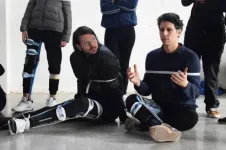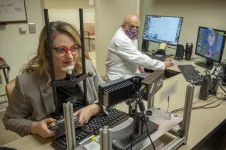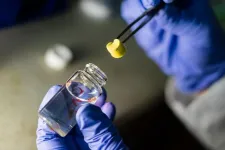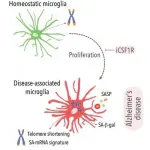(Press-News.org) Stereotypes are knowledge structures integrated in our world representation, which have an influence on our decisions and which are hard to change. A team from the Faculty of Psychology of the University of Barcelona (UB) and the Bellvitge Biomedical Research Institute (IDIBELL), in collaboration with the Èpica Foundation - La Fura dels Baus analysed how a performing experience could have a positive impact in reducing the population's bias against physical illnesses. This performing experience is a pioneer one for it combines scientific training and theatre performance in the same working platform.
The study, published in the journal Frontiers in Psychology, shows that the participation in a 14-day performing arts program reduces these implicit cognitive biases. According to the researchers, these results shed light on the development of strategies with performing arts to help treat this social problem in the general population. Participants in the study are Josué García-Arch (IDIBELL-UB), as first signatory, and Lluís Fuentemilla, both researchers at the IDIBELL Cognition and Brain Plasticity Unit and the Institute of Neurosciences of the UB (UBNeuro). Other signatories of the article are Cèlia Ventura-Gabarró, from the Pompeu Fabra University, and Pedro Lorente and Pep Gatell, from the Èpica Foundation - La Fura dels Baus.
The challenge of modifying stereotypes
Previous studies show that representation structures from which stereotypes derive are malleable, but achieving a change through an intervention is very difficult. "Studies in cognitive neuroscience indicate that a memory (or representation structure) can be altered if it reactivates efficiently in the brain. Also, if the memory goes with emotional context, this can increase the reactivation-derived change", notes Lluís Fuentemilla, coordinator of the study.
"On the other hand, --continues the researcher--, we also know that people tend to understand and integrate how others are if we are able to simulate them as if we were them".
Èpica Foundation has designed a performing experience that has these elements: the ability to simulate artistically a concept through performing arts developed om a context of intense emotion. The participants were sixteen amateurs, selected of the activity, who had to prepare a theatre play on several illnesses. With this objective, for two weeks, they received advice from experts on cancer and degenerative disorders from the Germans Trias i Pujol Research Institute (IGTP), who helped them to take in the disease and understand it from a multi-dimensional perspective (physiological, psychological, social impact, etc.). For instance, after these exchanges with the researchers, they simulated the daily life of patients with degenerative diseases or the life of the caregivers. The activity ended with a public performance in front of more than 300 people. "This work protocol gathers many features that enable us to think that the activation of knowledge structures that are the basis for stereotypes could make them malleable: emotion, continuity and first-person experience. These features are hard to work with under laboratory conditions or different practices in other programs, since they limit the motivation and commitment of the participants in the task, therefore hardening the chance to make reliable changes in the implicit bias at an individual level", notes Lluís Fuentemilla.
The effects of the intervention were measured with the implicit association test (IAT), an experimental task that allows the calculation of how long it takes for an individual to associate an item, for instance, with a word or an image, and a conceptual category: the longer the reaction, the harder it is to establish a link between concepts. "For instance, we know it takes longer to link an image of someone playing sport to the idea of "bad" than the "good" category, and the contrary happens wit the image of someone who wears a hospital patient robe. This difference in the reaction time shows we have an integrated "good" and "bad" category associated with a category linked to "healthy" and "ill" people, a phenomenon that, as expected, we found in the actors before the workshop", notes Josué García Arch, researcher of the project.
Once the program ended, the differences in reaction time had decreased in the participants, showing that the allocation of these ideas had decreased as well. Also, this reduction did not happen in two control experiments carried out on people of the same age, sex and education levels. One of these groups received the same scientific and medical information but without the arts, and did not show a change in the reaction time regarding the initial test. "This response shows that the experience provided by the performing activity was essential to reduce the negative stereotype towards ill people", note the researchers.
A potential strategy to treat other prejudices
These results shed light on the development of strategies based on this performing experience to treat problems related to stereotypes in the general population. "The way in which society faces stereotypes is based on education-derived processes and awareness in order to prevent these knowledge structures from being created. However, the problem of stereotypes is that this knowledge is attached to many situations of our society and coping with this in education is not enough. The presented protocol of the study enables us to open the way to reverse this problem using performing arts", states the researcher.
Moreover, according to the authors of the study, tis protocol could be used to treat other problems. "In this case, we have worked on the stereotype associated with the disease, but the program enables us to treat any stereotype, race or gender for instance, using the theme of performing arts", notes Lluis Fuentemilla.
A unique platform to create new knowledge
This study emerges in the frame of the platform created by Èpica Foundation, in which performing arts, science and technology are grouped to create new knowledge. The objective of this initiative is to create a performance based on research questions by the researchers to create results from the interactions between creatives, scientists and the audience. "Knowledge can be learnt through language and experiences, and performing arts have both. In addition, in the language of FURA, which prioritizes the interaction with the audience, the experience is lived by actors, creators and the audience at the same time. Therefore, in our space, we can create realities that the audience can feel as real, and therefore, their reaction will be more spontaneous than in a laboratory or in a test carried out by research groups in the workshop", note the members of Èpica Foundation.
The UB-IDIBELL team has taken part in two workshops: Information vs Memory, where they analysed the impact of this show on memory, and Complex Systems, the origin of this project. Moreover, it is also part of the European Performing Science Night project, co-funded by the Marie Sk?odowska Curie actions, and led by the Èpica Foundation, which will apply the same work methodology. The result will be the different dissemination activities that will take place in Badalona in September 2021 as part of the European Researchers' Night.
INFORMATION:
After looking for just one-twentieth of a second, experts in camouflage breaking can accurately detect not only that something is hidden in a scene, but precisely identify the camouflaged target, a skill set that can mean the difference between life and death in warfare and the wild, investigators report.
They can actually identify a camouflaged target as fast and as well as individuals identifying far more obvious "pop-out" targets, similar to the concept used at a shooting range, but in this case using easy-to-spot scenarios like a black O-shaped target among a crowd of black C shapes.
In fact, the relatively rapid method for training civilian novices to become expert camouflage breakers developed by Medical College of Georgia neuroscientist ...
Medics training to be GPs reported positive improvement in burnout and resilience after completing a mindfulness course specially designed for doctors
The participants in the study by Warwick Medical School also saw improvements in their wellbeing and stress
By improving the mental wellbeing of trainees the researchers hope to better prepare them for the challenges of general practice and the impact of Covid-19 on the profession
Supports the wider adoption of mindfulness in medical training and the need for larger studies
Medics training to become general practitioners reported a significant positive improvement in their mental wellbeing after participating in a specially-designed mindfulness programme, a study from University of Warwick researchers ...
HOUSTON - (June 8, 2021) - A simple chemical process developed at Rice University creates light and highly absorbent aerogels that can take a beating.
Covalent organic frameworks (COFs), crystal structures with strong molecular bonds, can form a porous aerogel for use as a custom membrane in batteries or other devices or as an absorbent to remove pollutants from the environment.
Conventional COFs are usually powders. Chemical and biomolecular engineer Rafael Verduzco, lead authors and Rice graduate students Dongyang Zhu and Yifan Zhu and their colleagues at Rice's Brown School of Engineering discovered a way to synthesize COF aerogels that can be made in any form ...
Listed by the World Health Organization among the ten leading causes of medical disability worldwide, the severity of obsessive-compulsive disorder (OCD) is at a level on par with cancer. This prevalent disorder is characterized by highly distressing intrusive thoughts and repeated compulsive behaviours such as washing or checking.
"Inadequately treated OCD can rapidly deteriorate to disability for many persons and can negatively impact every sphere of life including school or work, basic self-care and care of children, and psychosocial functioning," says clinical psychologist and internationally renowned expert in OCD and related disorders Dr. Debbie Sookman, who is an Associate Professor in the Department of Psychiatry ...
The promotion and marketing of unproven stem cell therapies is a global problem that needs a global solution, say experts in a perspective published June 8 in the journal Stem Cell Reports. The authors of the paper call for the World Health Organization (WHO) to establish an advisory committee on regenerative medicine to tackle this issue and provide guidance for countries around the world.
"The field of regenerative medicine, which entails the manipulation of cells and tissues to obtain therapeutic properties, has been hailed as the most promising research field in modern medicine," says senior author Mohamed Abou-el-Enein, the executive director of the joint University of Southern California/Children's Hospital of Los Angeles Cell Therapy Program. ...
A new study has pinpointed a small group of cells in the brain which could be crucial to understanding how Alzheimer's disease begins and how to slow its progression. This discovery could help research into treatment for the disease by focusing on this key group of cells in the brain.
Alzheimer's disease is the most common type of dementia, affecting between 50 and 75 per cent of those diagnosed. There are currently around 850,000 people with dementia in the UK. This is projected to rise to 1.6 million by 2040.
"Alzheimer's disease evolves over decades but we currently lack an understanding of the events that take place in the early stages," explained Dr Diego Gomez-Nicola of the University of Southampton ...
MELVILLE, N.Y., June 8, 2021 -- Variations in children's speech has traditionally been attributed to developmental delays. Recent work suggests the reasons for variability are not so clear, and an immediate call for treatment may need to be reconsidered.
During the 180th Meeting of the Acoustical Society of America, which will be held virtually June 8-10, Margaret Cychosz, from the University of Maryland, will discuss the need to better understand these variations. Her presentation, "Reconsidering variability in child speech production," will take place ...
Neural replay during waking rest may contribute to memory consolidation of action sequences in humans, according to a study published June 8 in the journal Cell Reports. Brain imaging results revealed fast, repeated reactivation of a neural network representing a behavioral sequence that people were learning--approximately 20 times the speed of the new memory--especially while they were taking breaks from practice.
"This is the first demonstration of wakeful neural replay of a newly learned skill elicited by practice in humans," says senior study author Leonardo G. Cohen (@LeonardoGCohen) ...
What The Study Did: The findings of this observational study of the association of race/ethnicity with COVID-19 infection rates and the interaction of pre-COVID experiences of food insecurity suggest that the association varied over time and across racial/ethnic groups.
Authors: Mare Sarr, Ph.D., of Pennsylvania State University in University Park, is the corresponding author.
To access the embargoed study: Visit our For The Media website at this link https://media.jamanetwork.com/
(doi:10.1001/jamanetworkopen.2021.12852)
Editor's Note: The article includes funding/support disclosures. Please see the article for additional information, including other authors, author contributions and affiliations, conflict of interest and financial disclosures, and funding and support.
INFORMATION:
Media ...
What The Study Did: This study tracked COVID-19 outcomes for 543 individuals with intellectual and developmental disabilities who were receiving support services from an organization providing residential services in the five boroughs of New York.
Authors: Scott D. Landes, Ph.D., of Syracuse University in New York, is the corresponding author.
To access the embargoed study: Visit our For The Media website at this link https://media.jamanetwork.com/
(doi:10.1001/jamanetworkopen.2021.12862)
Editor's Note: The article includes funding/support disclosures. Please see the article for additional information, including other authors, author ...



